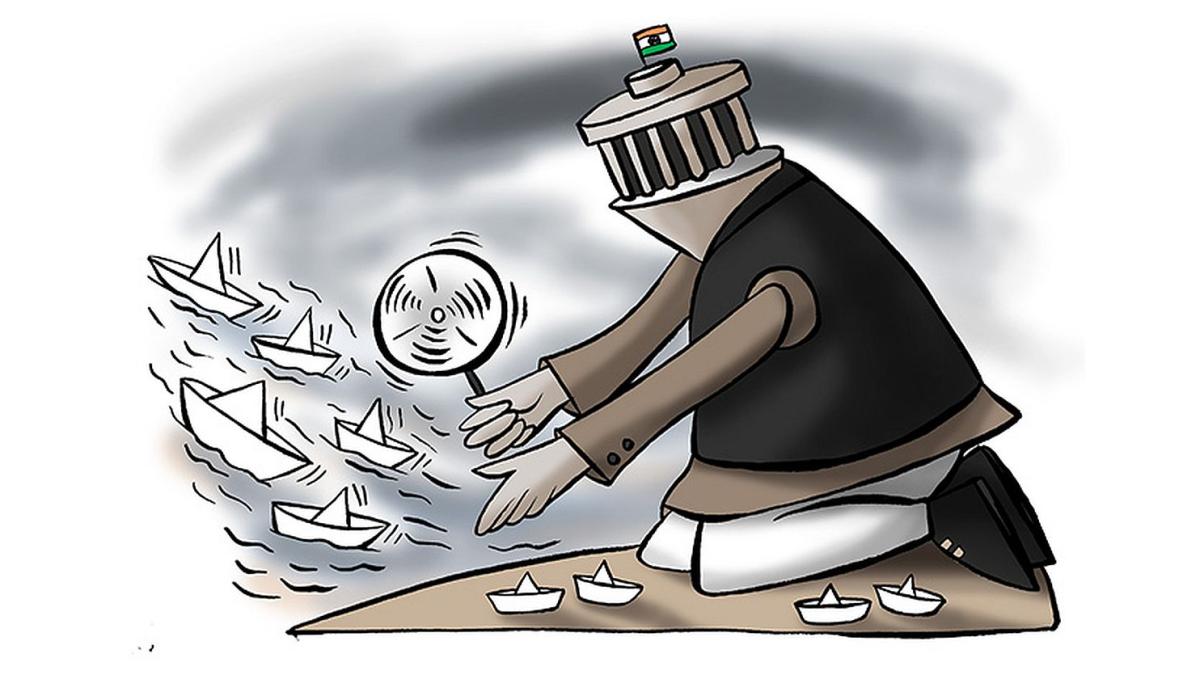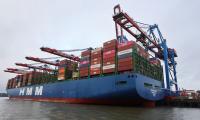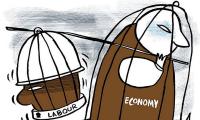India Aims for USD 1 Trillion Exports by 2030: Report Highlights Key Factors
A new report outlines strategies to achieve India's USD 1 trillion export target by 2030, emphasizing robust ecosystem development, value addition, market diversification, and trade policy improvements.

Illustration: Uttam Ghosh/Rediff.com
New Delhi, Aug 9 (PTI) A report has emphasised the critical role of public and private sector interventions towards creating a robust export ecosystem as the country aims to achieve USD 1 trillion in merchandise overseas shipments by 2029-30.
The Government has a significant role to play in the creation of an enabling ecosystem and the VIKSIT framework offers strategic guidance to various government bodies to resolve bottlenecks and drive export growth across key sectors such as automobiles, electronics and food processing, said the PwC report.
The report 'VIKSIT: An approach for India to achieve USD 1 trillion exports' was launched by Minister of Commerce and Industry Piyush Goyal on Thursday.
The report suggested five considerations that need to be weighed in while charting India's export growth journey.
While adding scale, India's manufacturing sector also needs to improve its value addition ratio to prevent commoditisation of the export basket and ensure that exports move towards high value-adding and emerging segments.
In addition to product diversification, it emphasises the criticality of expanding India's geographic market access to mitigate market concentration.
The report exhorts the need for the country to pursue a trade strategy to position Indian products competitively while reducing the burden of compliance and non-tariff barriers (NTB) conformity.
Sanjeev Krishan, Chairperson, PwC in India, said the country's rise to becoming the fifth largest global economy is mirrored by its increasing share in global trade, driven by a focus on export-led growth.
The VIKSIT framework can be leveraged over the coming years to enable a continuous dialogue on enabling competitiveness across the government and the private sector, he said.
Amongst its many action-oriented recommendations, the VIKSIT framework advises a technology-driven pathway for the automobile sector wherein OEMs lead the enablement of the entire supply chain by integrating tier-2 and tier-3 manufacturers.
It emphasises that electronics export growth should be driven by backward integration in manufacturing to improve value addition and scale expansion simultaneously.
Access to capital, skills and innovation will be required to build sector capabilities.
For food processing, it will be crucial to move up from primary processing to cater to the demand for secondary and above, and diversify towards convenience with ready-to-eat/cook alternatives while ensuring alignment with global food standards.
The Government has a significant role to play in the creation of an enabling ecosystem and the VIKSIT framework offers strategic guidance to various government bodies to resolve bottlenecks and drive export growth across key sectors such as automobiles, electronics and food processing, said the PwC report.
The report 'VIKSIT: An approach for India to achieve USD 1 trillion exports' was launched by Minister of Commerce and Industry Piyush Goyal on Thursday.
The report suggested five considerations that need to be weighed in while charting India's export growth journey.
While adding scale, India's manufacturing sector also needs to improve its value addition ratio to prevent commoditisation of the export basket and ensure that exports move towards high value-adding and emerging segments.
In addition to product diversification, it emphasises the criticality of expanding India's geographic market access to mitigate market concentration.
The report exhorts the need for the country to pursue a trade strategy to position Indian products competitively while reducing the burden of compliance and non-tariff barriers (NTB) conformity.
Sanjeev Krishan, Chairperson, PwC in India, said the country's rise to becoming the fifth largest global economy is mirrored by its increasing share in global trade, driven by a focus on export-led growth.
The VIKSIT framework can be leveraged over the coming years to enable a continuous dialogue on enabling competitiveness across the government and the private sector, he said.
Amongst its many action-oriented recommendations, the VIKSIT framework advises a technology-driven pathway for the automobile sector wherein OEMs lead the enablement of the entire supply chain by integrating tier-2 and tier-3 manufacturers.
It emphasises that electronics export growth should be driven by backward integration in manufacturing to improve value addition and scale expansion simultaneously.
Access to capital, skills and innovation will be required to build sector capabilities.
For food processing, it will be crucial to move up from primary processing to cater to the demand for secondary and above, and diversify towards convenience with ready-to-eat/cook alternatives while ensuring alignment with global food standards.
You May Like To Read
TODAY'S MOST TRADED COMPANIES
- Company Name
- Price
- Volume
- Vodafone-Idea
- 11.36 ( -2.49)
- 94664837
- AvanceTechnologies
- 1.16 (+ 4.50)
- 34522155
- Sunshine-Capital
- 0.26 ( -3.70)
- 29015901
- Alstone-Textiles
- 0.27 ( -3.57)
- 28695959
- Mehai-Technology
- 1.65 ( -4.62)
- 28262795






